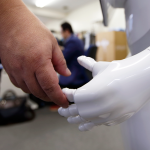 January 3, 2018 – In late 2016, a ghost truck rumbled down a Colorado highway carrying 50,000 cans of Budweiser beer.
January 3, 2018 – In late 2016, a ghost truck rumbled down a Colorado highway carrying 50,000 cans of Budweiser beer.
The cab of the truck was empty but the truck hewed to the dotted highway lines with eerie precision. If it alarmed any passing motorists, no one piped up about it and, to be fair, anyone with sharp vision would’ve spotted a man crouched in the back, keeping an eye on things.
The driverless truck is just one instance of the supernatural normalcy we can expect as artificial intelligence invades everyday life.
AI — perhaps more accurately called machine learning — is already doing a lot more than just publicity stunts. If you’ve noticed that voice recognition and real-time translation have gotten a lot better recently, you can thank the Canadians who developed the Deep Learning techniques powering them.
The management consulting firm McKinsey & Company estimates that automation brought about by AI could boost productivity more than the steam engine did in the 19th century and the IT revolution did in the 1990s.
…
Goldie Nejat, the director of the Institute for Robotics and Mechatronics at the University of Toronto, said it’s likely that “fetch and carry” helper robots are the next stage. For elderly people in the early stages of cognitive impairment it could allow them to live in their homes longer.
A robot could nudge the person to have dinner at 6 p.m., take their pills or look through a recipe book with them to help get motivated. That would leave the more compassionate — or uniquely human — duties to healthcare workers and free them from the repetitive jobs.
